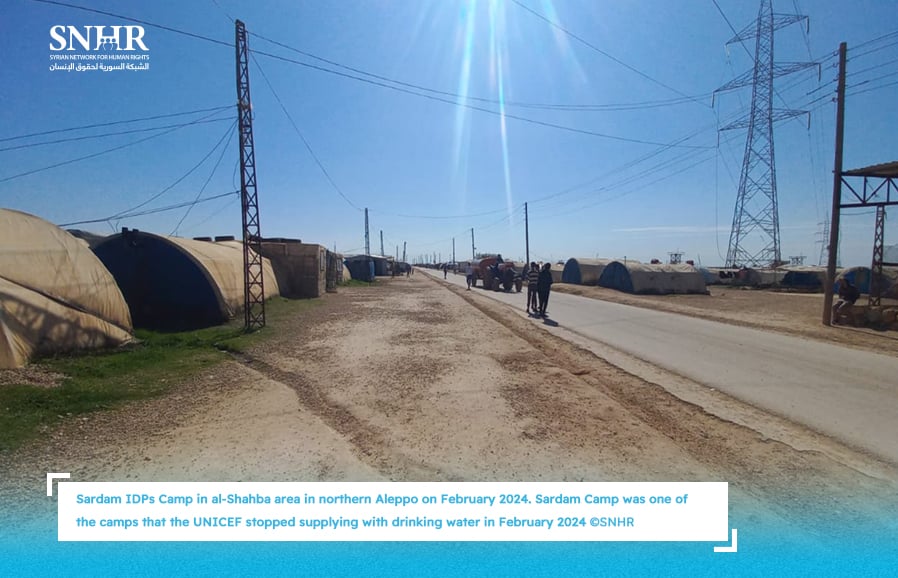
Languages
Available In
Around 2,000 families in five different camps housing internally displaced persons (IDPs) are grappling with a severe water shortage, with the situation rapidly escalating towards a major, life-threatening humanitarian crisis. Since Thursday, February 15, 2024, UNICEF has abruptly stopped its operations in the area due to a lack of funds.
These IDP families live in five camps controlled by the Syrian Democratic Forces (SDF) in al-Shahba area[1] of northern Aleppo governorate. The families are IDPs originally from Afrin city and several areas in northern rural Aleppo. The five camps are: Sardam Camp (al-Asr), housing around 1,050 families; Barkhdan Camp (al-Muqawma), housing about 700 families; Faghir Camp al-Awda), housing about 125 families; Afrin Camp, housing about 108 families, and al-Shahba Camp, housing about 148 families.
Prior to ceasing its operations in the area, UNICEF would supply drinking water through filling plastic water tanks in those camps. This water supply is transferred from Aleppo city through water tenders. Given the lengthy duration of the lack of any replacement drinking water supply and the controlling forces’ failure to secure a new water supply for these camps, the residents have no choice but to buy water from artesian well owners, resulting in several complications. Amongst other things, the available quantity of this water is severely limited, while there are numerous logistical challenges in transferring it to the camps. However, the most pressing issue is the fact that the artesian well water is often contaminated and dangerous to consume. As such, the Syrian Network for Human Rights (SNHR) warns of the potential risk of waterborne diseases spreading in these communities.
It should be noted that al-Shahba area and the IDP camps there are already struggling with a shortage of basic supplies and foodstuffs due to the restrictive practices and policies of the military personnel at checkpoints erected by Syrian regime forces in al-Shahba area. UNICEF had ceased supplying drinking water to many villages and towns in the area in 2020 and 2021, and limited such operations to IDP camps, until now.
SNHR is disheartened by the decision to reduce funds allocated for humanitarian assistance in Syria. This reduction in desperately needed funds comes after a similar one by the UN World Food Programme (WFP) which announced on December 14, 2023, that its humanitarian assistance program would be reduced across Syria.
In light of these life-threatening challenges, SNHR urges donor states to increase their donations, and calls on the UN Office for the Coordination of Humanitarian Affairs (OCHA), and other international relief bodies to provide urgent assistance to swiftly address this water crisis. We also call for the reinstatement of these water relief programs and ensuring continued water access. Moreover, we call for increasing the funds for international organizations so they can continue their vital operations, especially in northern and western Syria, where hundreds of IDP camps are located.
Finally, as the controlling force in the area, we call on the SDF to act urgently and work to find alternative solutions to deliver water to IDPs in their areas. The SDF bears legal responsibility for all residents in areas under its control. SNHR strongly condemns the restrictions imposed by regime forces which impede the movement and delivery of basic and food supplies to al-Shahba area, which compromise local residents and IDPs alike.


